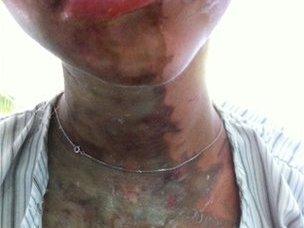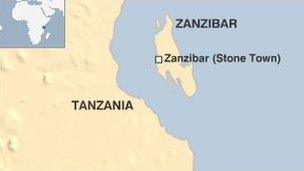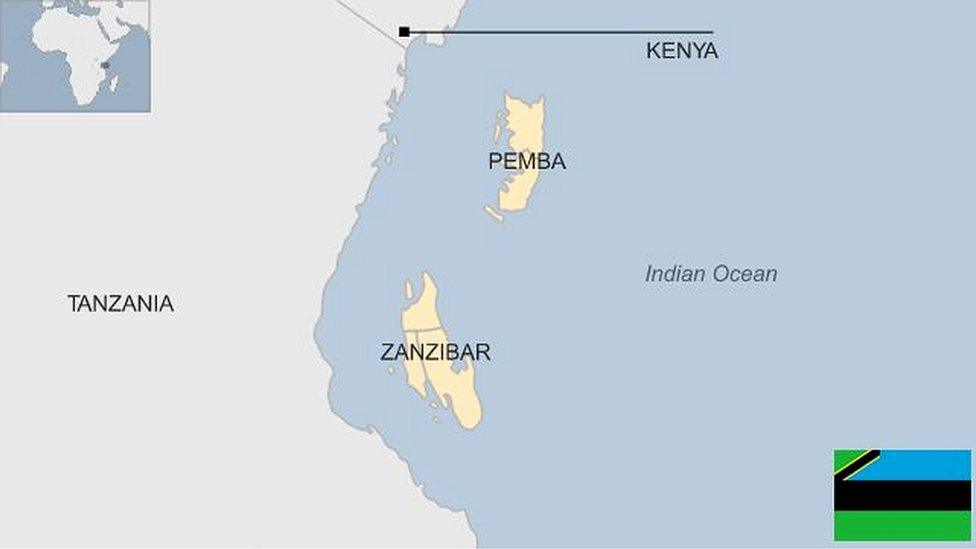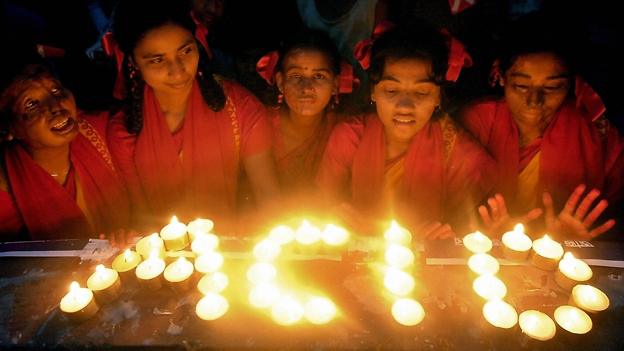Zanzibar acid attack victim thanks supporters
- Published
The BBC's Alastair Leithead: Katie Gee and Kirstie Trup "arrived shaken and traumatised"
One of the British women who was attacked with acid in Zanzibar has thanked supporters on her return to the UK.
From Chelsea and Westminster Hospital in London, Katie Gee said on Twitter: "Thank you for all your support x".
She and Kirstie Trup, both 18, are receiving treatment for their burns after returning to the UK on Friday.
Zanzibar police have offered a £4,000 reward for information leading to capture of the attackers.
Doctors treating the pair in the burns unit said they were "well".
A police commissioner told the BBC several people were being questioned.
However, no motive has yet been established and the investigation continues.
Police said acid was thrown on the teenagers' faces, chests and hands as they walked through the streets of Stone Town, the old part of the island's capital Zanzibar City, on Wednesday evening.
'Completely unprovoked'
A photograph released by the girls' families showed the injuries one of them suffered in the attack. Marks are clearly visible on her chin, neck and chest.
Andy Williams, who is a burns and plastic surgeon at Chelsea and Westminster Hospital, in west London, said the pair's injuries were being assessed.
"Both girls are well, and their families are with them," he said.
"They will be staying at Chelsea and Westminster Hospital. Both families would like to thank everyone that's helped to bring the girls back."
The teenagers' mothers, Rochelle Trup and Nicky Gee, said they were "extremely upset" by the "completely unprovoked attack" carried out by two men on a moped.
Miss Trup's father Marc told The Daily Telegraph that one of the girls' injuries was worse than the other's due to their different reactions.
One reportedly ran into the sea after the attack, while the other used dirty water on her burns.
Mr Trup said: "That completely altered the result: the salt water and the acid.
"The other girl panicked, ran around, made her way to a public toilet".
When they reached a medical centre, there was no shower. "They were throwing dirty water at her," he added.

The families supplied this picture of acid burns on one of the two victims
A British tourist tried to help the pair after the attack. Sam Jones, who was on holiday with his girlfriend Nadine, told The Sun that he heard the pair's screams and found one of them crouching by a toilet block in pain.
"She just kept screaming that she needed water," he told the newspaper. "My girlfriend grabbed a hose and we started to wash her down as best we could.
"At this stage we had no idea what had happened but it was obvious something was very wrong."
He said the acid burned his hands as he tried to help the teenager. The couple supported the victims by joining them on a private plane to Dar es Salaam on the Tanzanian mainland for treatment.
'Lovely daughters'
Reporting from the scene of the attack, the BBC's Alastair Leithead said the attackers sped away after the incident, and police did not know why the women were targeted.
The women's mothers said in a statement issued on Thursday: "Both families are extremely upset and distressed at this completely unprovoked attack on their lovely daughters who had only gone to Zanzibar with good intention."
The women were two weeks into a three-week trip.

A spokeswoman for i-to-i Travel, which organised the women's volunteering trip, said volunteers due to arrive in Zanzibar this weekend had been given the option to volunteer at an alternative project but all had chosen to continue to travel to Tanzania.
Police on Zanzibar said it was the first time foreigners had been attacked in this way.
The BBC's Tulanana Bohela, in Dar es Salaam, said Islam is the main religion on Zanzibar and in more remote parts of the island, away from tourist beaches, there are signs asking foreigners to respect the local culture and cover up - in case skimpy outfits upset villagers.
However, most islanders depend on tourism for their livelihoods and are happy to see tourists and there is little antagonism towards them, she said.
- Published10 August 2013

- Published9 August 2013

- Published9 August 2013

- Published8 August 2013

- Published2 May 2023

- Published9 August 2013
